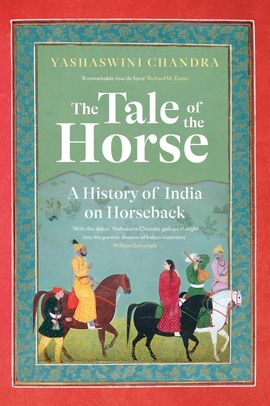
The Tale of the Horse
Synopsis
Shortlisted for the AutHer Award – Best Debut
Longlisted for the Karwaan Book Prize
‘A remarkable tour de force’ Richard M. Eaton
'With this debut, Yashaswini Chandra gallops straight into the premier division of Indian historians’ William Dalrymple
‘Highly original ... combining flawless scholarship with the author’s intimate knowledge of horses’ Partha Mitter
The horse is etched on the Indian landscape, and to view the subcontinent’s past through the prism of the horse is to be swept up in its power and grace. Horses are a thread that connects Indian history, mythology, art, literature, folklore and popular belief.
In this inspired and singularly erudite debut, Yashaswini Chandra takes us on the trail of the horse into and within India. What follows is a surprising and exhilarating journey, covering caravan-trade routes originating in Central Asia and Tibet, sea routes from the Middle East, and the dominions of different sultans and Mughal emperors, the south Indian kingdoms as well as the Rajput horse-warrior states. She outlines the political symbolism of the horse, its vital function in social life, religion, sport and war, its role in shaping economies and forging crucial human bonds. We learn of the emergence of local breeds such as the Kathiawari and the Marwari, the Zanskari and the Manipuri. We encounter fabulous horsewomen too, Chand Bibi, Maratha princesses and women polo players among them. We meet grooms, farriers, breeders, traders and bandits. The highlight of course are the magnificent examples of the horse itself – Rana Pratap’s legendary Chetak, Ranjit Singh’s much-contested Laili, Pabuji’s cherished black mare and those horses captured in paintings and equestrian portraits. This glorious age of the horse would meet its agonized decline with the onset of colonial rule and mechanization.
In the end, what is most remarkable is that the history of the horse in India, mirroring that of its human inhabitants, is a tale of migration and permanent intermingling. The horse is thus an exceptional and fitting vantage from which to appreciate the history of the land, influenced as it was by this most instrumental of animals.
Details
Reviews
‘A wonderfully elegant and lively writer, whose enthusiasm for her subject is effortlessly channelled into pitch-perfect prose. Yashaswini Chandra is in total command of an impressive sweep of sources: epics and chronicles, romantic ballads and wedding songs, art and folklore, as well as all conceivable manuals equestrian. With this remarkable debut, full of wit and brilliance, she rides into the lists like the Rani of Jhansi, galloping straight into the premier division of Indian historians’ – William Dalrymple, author of Th e Anarchy: Th e East India Company, Corporate Violence, and the Pillage of an Empire
‘A remarkable tour de force. Th is comprehensive survey of the role of the horse in Indian history is meticulously researched and lucidly written. Its erudition will ensure its place on the bookshelves of academics, while its wit and accessibility will assure a wide readership among the general public’ – Richard M. Eaton, author of India in the Persianate Age: 1000–1765
'One of the achievements of Chandra is to look beyond the elitist discourse on horses in India . . . [She] delves into this complex history in depth . . . entertainingly mixes “stories” with “histories”, using one to comment on the other, though thankfully without a postmodernist erasure of all difference between the two . . . The horse reminds us that we, in India, still need to face up to many areas of evasion relating to caste and class, and their overlap’ – Tabish Khair, author of Night of Happiness
‘The horse has been central to Indian culture but until now it has lacked its own chronicler. This highly original, elegant and witty monograph fills the lacuna, combining flawless scholarship in political, social and art histories with the author’s intimate knowledge of horses. The gripping tale will be a role model for all future studies of the subject’ – Partha Mitter, author of Much Maligned Monsters: A History of European Reactions to Indian Art
‘The horse is a beautiful animal, so it is fitting that an art historian should take us through the history of India on horseback . . . We are left with an ever richer picture in the mind’s eye of this most visual of countries . . . Always lucid and insightful . . . Chandra is a gifted storyteller’ – Asian Review of Books
‘Yashaswini Chandra’s history of Indian equitation is a showpiece of scholarship, conveyed with all the exuberance and energy of an early morning canter’ – Biblio
‘[The Tale of the Horse] brings to light a relatively unexplored subject through an erudite yet effortless narrative style . . . a homage to two of Chandra’s enduring affections – horses and history’ – BusinessLine

